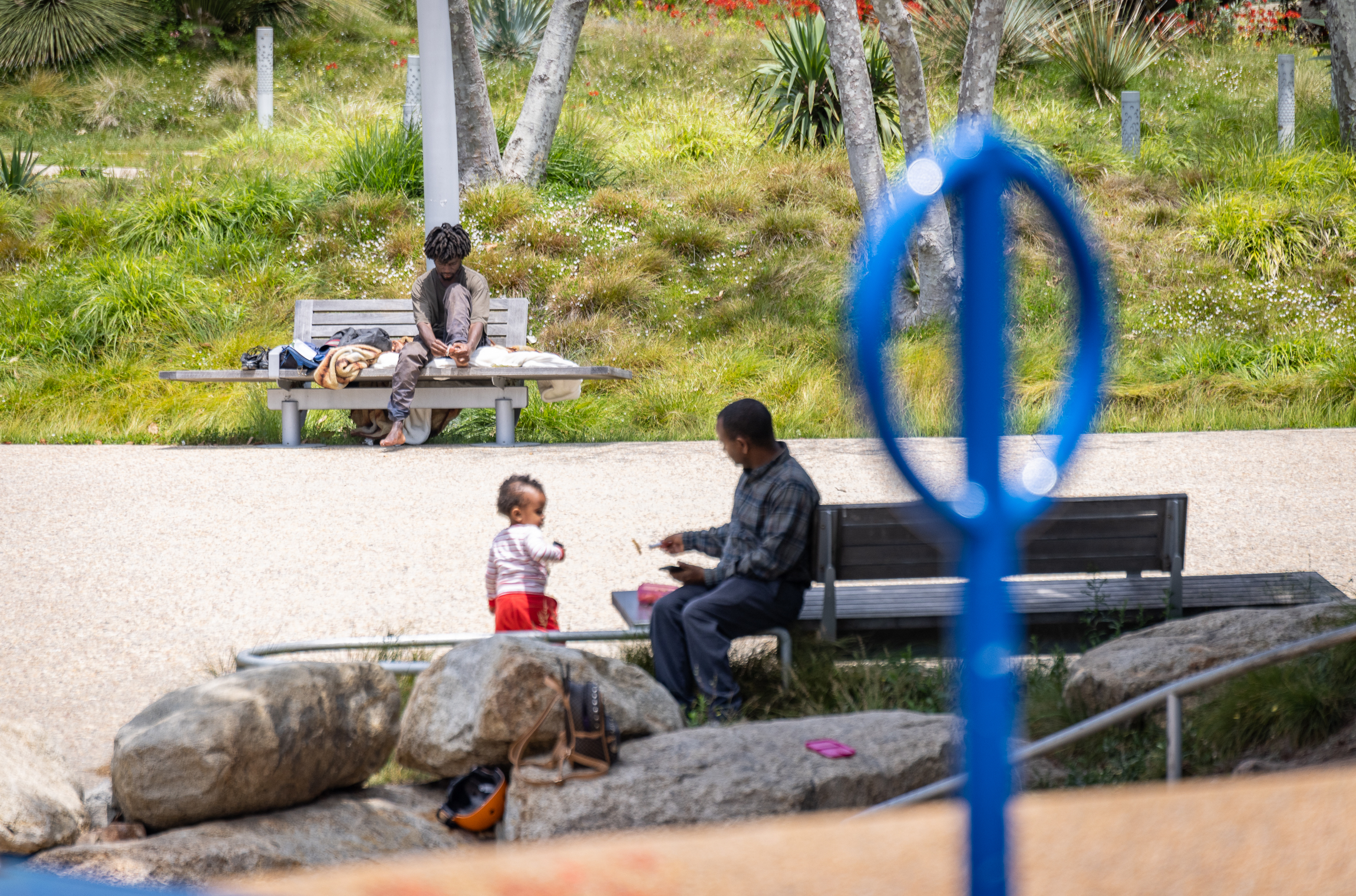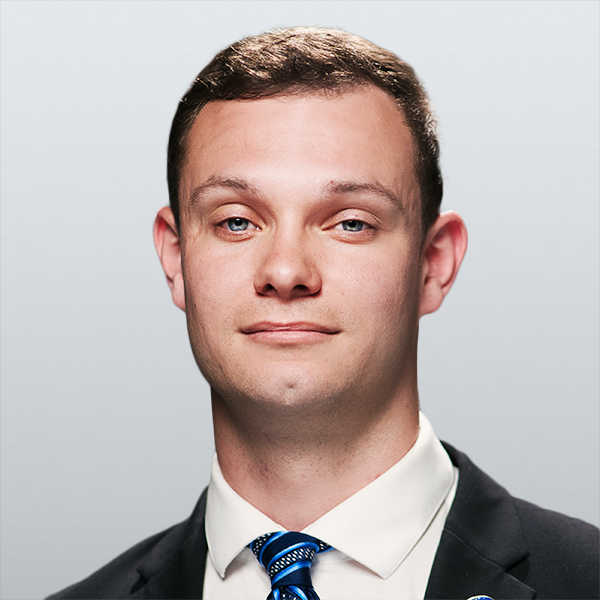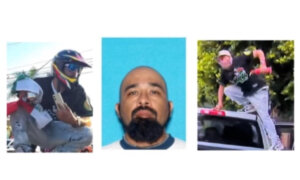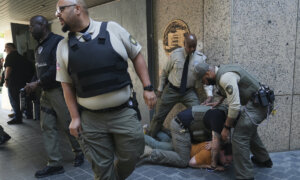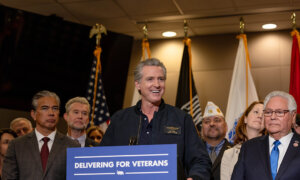Santa Monica leaders and residents have joined forces to call on Los Angeles County health officials to immediately stop a needle exchange program that they say is responsible for dirty needles in their parks and an increase in crime and homelessness.
City leaders have twice asked for the program to be moved away from the city’s parks. Their efforts have included passing a resolution on April 9 asking the Los Angeles County Board of Supervisors to request that the Los Angeles County Department of Public Health, which administers the program, move the program indoors.
The city’s previous council sent a letter to the Los Angeles Board of Supervisors in September 2022 asking for the same thing.
About 50 people gathered on April 16 to once again make the request, this time via a public protest.
“I think that most important here ... our children do not need to be exposed to open drug use, period,” Santa Monica City Councilwoman Christine Parra said during the protest.
Most of the people attending the event—held at Christine Emerson Reed Park, one location where the so-called harm reduction program is carried out—could be heard chanting “no more needles in our parks.”
Locals say they are concerned that the passing out of clean syringes attracts drug users to the parks, and it has made them unsafe for local residents, including children and senior citizens. Nearly 72 percent of Santa Monica residents live in apartments, according to the U.S. Census Bureau, leading them to rely on city parks for outdoor recreation and relaxation.
“I want you to look around for a minute,” Santa Monica Mayor Phil Brock said, motioning with his arm. “I have two children’s playgrounds right here. I have a tall senior citizen complex across the street. For that complex, this is their only breathing room. This is their only green space.”
Directly across the street from Reed Park is St. Monica Catholic Church and St. Monica Preparatory—a K–12 school. Additionally, about a half-block away is the Boys and Girls Club of Santa Monica, where as many as 200 to 300 youths visit during after-school hours, according to city officials.
“You’re increasing the chance that some child running barefoot in the park will step on a needle or a groundskeeper will reach in the bushes to clean. ... then get stabbed by a needle,” Mr. Brock told The Epoch Times in a recent interview.
Mayor Pro Tem Lana Negrete was also in attendance and said the county-administered program flew under her radar when she first joined the council in 2021 and that she first learned of it after residents complained in 2022.
No one seemed to know about the program when she raised the issue to the council, she said.
“Whether it be our elderly or children or just people enjoying some open space during lunch break, we rely on our parks to be safe places,” Ms. Negrete said at the protest.
The county has been contracting with the Venice Family Clinic, a community health center with several locations in the Los Angeles area, to conduct the program since 2019.
Health officials said in a statement earlier this year that because the program targets those who are not likely to look for help on their own, it’s important to meet them where they are, such as in the parks.
“It is a well-established best practice to provide mobile harm reduction services directly to people where they physically are,” a joint statement issued by the Los Angeles County Department of Public Health and City of Santa Monica reads. It also notes that the services are compliant with California’s health and safety code.
Currently, the program is offered on Friday afternoons for as long as three hours at Reed, Tongva and Palisades parks. According to health officials, clinic workers distribute about 100 syringes weekly and dispose of dirty needles at the three locations.
However, according to city officials, residents, and community advocates, needles are often left behind and not picked up at the rate that they’re distributed.
Ms. Negrete said she has personally witnessed homeless individuals pass bags of clean needles among themselves, with no one being offered services.
“What I witnessed is what I was most appalled by. It was not a one-for-one exchange. ... Some were being exchanged with other members, between each other [and] not by a professional,” she said during the protest.
Ms. Negrete told The Epoch Times that she had raised concerns about the program twice in 2022, including with her fellow councilmembers during a council meeting and at another time with public safety officers.
During the protest, Councilman Oscar de la Torre said the city isn’t against the county offering opioid reversal medication or treatment services, but it is against having the needle exchange program near places where residents and visitors congregate.
“It’s wrong to be bringing the needles into parks, to meet them where they’re at, that approach right there makes no sense,” he said. “The great majority of people who live in our city depend on public parks, depend on our beaches, depend on the public space.”
One resident attending the protest, who gave only her first name, Ann, said she lives within a half-block of Reed Park and that there have been a handful of times in the past several years where she believed that her son was in danger because of drug users and homeless persons at the location.
Ann said her son had been mugged at the park a couple of years ago and his phone was taken, but he was told to not call the police.
After that, she told The Epoch Times, her son told her, “Can we please move to somewhere safe. I don’t feel safe here.”
Now 16 years old, he has asked to carry a knife, as some of his friends do, for protection, Ann said.
Whitney Bain, who has lived in Santa Monica for more than 50 years and attended the protest, told The Epoch Times that it’s not safe to walk the streets of Santa Monica after hours.
“Unless you’re a big guy and you can handle yourself ... if there’s a little old lady who wants to be by herself, she’s going to get accosted,” he said.
Mr. Bain, who unsuccessfully ran for city council in 2022, said Santa Monica used to be a safe place, but now it isn’t even safe for dogs because they may accidentally eat fentanyl strewn on the streets.
He mentioned one such occurrence at the area’s Third Street Promenade, an outdoor area for shopping and eating.
“On the Promenade, there was a woman who was walking her dog, and her dog ate what looked like candy, but it was fentanyl. The dog went blind, and the dog’s probably dead by now, which is really sad,” Mr. Bain said.
The Santa Monica Coalition, a group of retail and commercial tenants, residents, and property owners, recently filed a lawsuit against county Health Director Barbara Ferrer, the Los Angeles County Health Department, and the Venice Family Clinic alleging that the program was secretly started in 2019 without consulting local police and without the 45-day public comment period required by the state’s health and safety code when authorizing such a program.
Members of the coalition first brought the program to the attention of city council members in 2022, according to coalition founder John Alle. The Epoch Times confirmed his account with two current city council members.
In their lawsuit, they allege that two former mayors, Sue Himmelrich and Gleam Davis, who is currently on the council, knew of the program but did not inform the public or other members of the council. The two, as well as former City Manager Lane Dilg and current City Manager David White, will be sued separately.
Recently, California has cracked down on cities and counties that have pushed back on similar needle exchange programs. The state in March sued El Dorado County and the City of Placerville, located in northeastern California, for banning a similar program.
In 2005, the California Legislature passed the Clean Needle Syringe and Exchange Project law, which allows counties and cities to decide if they want to participate in distributing clean syringes and other drug paraphernalia to reduce the spread of diseases such as HIV and AIDS.
The Legislature later in 2011 amended the law to allow the state’s Public Health Department to authorize the program anywhere in the state without approval from officials of impacted cities or counties.
Los Angeles County began receiving state funding to distribute syringes in 2007, according to city and county officials, and the state’s health department authorized El Dorado County’s program in 2020.
